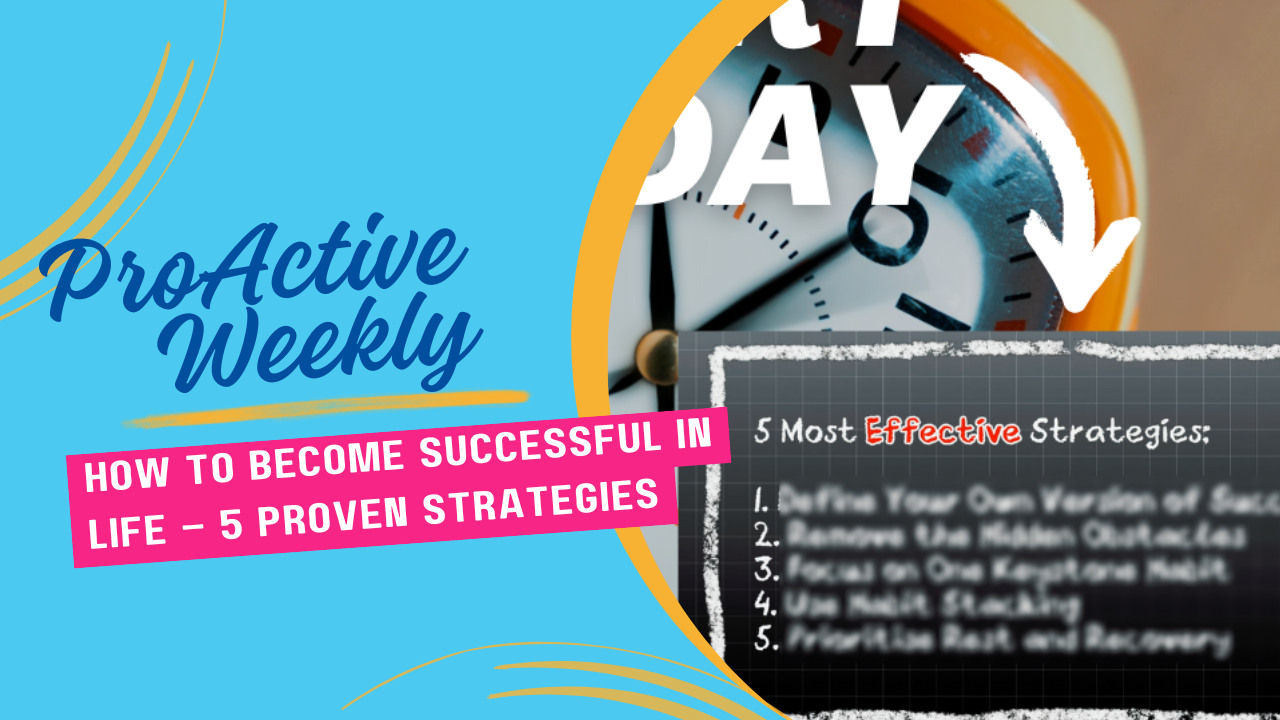
Success is about feeling fulfilled, balanced, and in control of your life. It’s about having enough time for the things that matter—health, relationships, family, and personal passions—and achieving meaningful progress in each.
But for many people, success feels like a constant struggle.
There’s never enough time, energy, or clarity to move forward in all areas of life at once. The pressure to do more and be more can lead to burnout, stress, and procrastination.
The good news? How to become successful in life isn’t about doing everything.
It’s about doing the right things consistently.
Science shows that the most successful people don’t rely on motivation or willpower. Instead, they focus on clarity, habit formation, and removing obstacles that hold them back.
Understanding the following five research-backed strategies allows you to create lasting success without sacrificing your well-being.
Why Traditional Success Advice Doesn’t Work
Many success strategies focus on working harder, sacrificing sleep, and pushing through exhaustion. The common advice is to:
- Work longer hours to “grind” your way to success
- Wake up and join the “5 AM Club” to fit in a rigid morning routine
- Push yourself to be more disciplined and productive every day
This doesn’t work.
When life is already demanding, adding more to your plate only leads to frustration and exhaustion.
Success isn’t about doing more—it’s about working smarter.
Instead of forcing yourself into someone else’s idea of success, the key is to build habits that work for you and focus on progress that aligns with your values.

The Science of Success in Life: What Really Works
Research in psychology and neuroscience reveals that successful people don’t rely on sheer determination. Instead, they:
- Define success clearly – They know what matters most in life, beyond just money and career.
- Remove obstacles – They eliminate distractions and self-sabotaging habits that slow them down.
- Focus on habits that create the most significant impact – They prioritise a few key behaviours that drive progress across multiple areas.
- Make success feel effortless – They use habit stacking to integrate positive routines into daily life.
- Prioritise rest and renewal – They avoid burnout by protecting their energy and focusing on sustainability.
Applying these principles fulfils your vision of success—whether that includes financial stability, career growth, strong relationships, better health, or more time for personal passions—all without feeling overwhelmed.
5 Proven Strategies for Achieving Lasting Success in Life
1. Define What Success in Life Means for You
Success isn’t one-size-fits-all. What works for someone else may not bring you happiness. Instead of chasing external markers like job titles or income levels, take a step back and ask:
- What areas of life bring me the most fulfilment?
- If I had total freedom, how would I spend my time?
- What’s missing from my life that I want more of?
Success might mean:
- Financial stability without constant stress
- A thriving career that’s meaningful and rewarding
- Deep connections with family and friends
- A sound body and mind that supports your ambitions
- Time for hobbies, creativity, and relaxation
When you define success on your own terms, you can focus on what actually makes a difference—rather than wasting time on things that don’t matter.
2. Remove Hidden Obstacles Slowing You Down
Most people don’t fail because they lack ambition or talent. They fail because they unknowingly work against themselves.
Common roadblocks to success include:
- Procrastination: Putting off important tasks due to fear or uncertainty
- Perfectionism: Waiting for the “perfect” plan instead of taking action
- Overcommitment: Saying yes to too many things, leaving no time for personal goals
- Distractions: Constant interruptions from social media, emails, and notifications
The most effective way to move forward isn’t to work harder—it’s to remove the things that slow you down.
Example: If distractions are a problem, schedule focused work sessions where you turn off notifications and block time for deep work.
3. Focus on One Keystone Habit
A keystone habit is a single habit that creates a ripple effect across multiple areas of life. Instead of trying to improve everything at once, successful people focus on one high-impact habit that naturally leads to other positive changes.
Examples of keystone habits:
- Daily Planning: Spending five minutes each morning setting clear priorities
- Evening Reflection: Reviewing what worked well and what needs improvement
- Consistent Exercise: Boosting mental clarity, energy, and discipline
- Focused Work Blocks: Creating distraction-free time for high-impact tasks
- Regular Family Time: Strengthening relationships and reducing stress
Once this one habit is in place, other improvements follow naturally.
Example: A small business owner who struggled with focus and low energy started prioritising daily exercise. Within months, he noticed higher productivity, better decision-making, and improved relationships—all from one small habit shift.
4. Use Habit Stacking to Make Success in Life Automatic
Successful people don’t rely on willpower. They use habit stacking—a technique that makes good habits effortless by linking them to existing routines.
How it works:
- Attach a new habit to something you already do
- Repeat it consistently until it becomes automatic
Examples:
- After making coffee, spend two minutes planning your top three priorities.
- After putting the kids to bed, reflect on what worked well today.
- After dinner, take a short walk to clear your mind.
This method makes it easier to build success habits without added stress.
Example: James Clear, author of Atomic Habits, found that people who stacked one new habit onto a routine they already had were significantly more likely to stick with it.
5. Prioritise Rest and Recovery for Long-Term Success in Life
Many people burn out because they treat success like a sprint. But true success is a marathon, requiring strategic recovery.
The most successful people understand that rest isn’t a distraction from success—it’s a requirement.
Ways to avoid burnout:
- Schedule non-negotiable downtime (just like work meetings).
- Say no to unnecessary commitments (protect your time).
- Redefine productivity (focus on results, not hours worked).
When you prioritise rest and renewal, you improve focus, creativity, and long-term motivation.
Example: Research on elite athletes shows that recovery is just as important as training. The same applies to high achievers—strategic breaks lead to higher productivity and better decision-making.

The Impact of These Strategies on Your Success in Life
By shifting your approach to success, you’ll experience:
- Less stress, more clarity – Know exactly what to focus on each day
- Better work-life balance – Feel in control of your time and commitments
- Consistent progress – Small daily actions leading to significant results
- More fulfilment – Success will feel sustainable and rewarding
Success isn’t about doing everything. It’s about doing the right things consistently.
Your Next Step
What’s one small habit you can introduce today to move closer to success?
If you feel overwhelmed or stuck, start with a daily planning routine. Taking just five minutes each morning to prioritise your day can transform your productivity and mindset. True success isn’t about doing more—it’s about doing what matters most.
Our FREE mindset mastery video series will show you exactly how to implement these strategies—so you can finally move forward without the struggle.
🎥 Watch the full Mindset Mastery Playlist.

References
- Clear, J. (2018) Atomic Habits: An Easy & Proven Way to Build Good Habits & Break Bad Ones. New York: Penguin Random House.
- Duhigg, C. (2012) The Power of Habit: Why We Do What We Do in Life and Business. New York: Random House.
- Fogg, B.J. (2009) ‘A behavior model for persuasive design’, Proceedings of the 4th International Conference on Persuasive Technology, pp. 1-7. doi:10.1145/1541948.1541999.
- Gardner, B., Lally, P., & Wardle, J. (2012) ‘Making health habitual: the psychology of ‘habit-formation’ and general practice’, British Journal of General Practice, 62(605), pp. 664-666. doi:10.3399/bjgp12X659466.
- Wood, W., & Neal, D. T. (2007) ‘A new look at habits and the habit-goal interface’, Psychological Review, 114(4), pp. 843-863. doi:10.1037/0033-295X.114.4.843.
- Focus Bear (2023) Distraction epidemic: The impact of distraction on productivity and the hours lost per week. Available at: https://www.focusbear.io/blog-post/distraction-epidemic-the-impact-of-distraction-on-productivity-and-the-hours-lost-per-week (Accessed: 25 February 2025).
- James Clear (2024) How to break a bad habit (and replace it with a good one). Available at: https://jamesclear.com/how-to-break-a-bad-habit (Accessed: 25 February 2025).
- Psychology Today (2023) Self-sabotage: Why we do it and how to stop the cycle. Available at: https://www.psychologytoday.com/us/basics/self-sabotage (Accessed: 25 February 2025).
- T-three (2024) The neuroscience of habits part one. Available at: https://www.t-three.com/thinking-space/blog/neuroscience-habits-part-one (Accessed: 25 February 2025).
- Verywell Mind (2023) Why people self-sabotage and how to stop it. Available at: https://www.verywellmind.com/why-people-self-sabotage-and-how-to-stop-it-5207635 (Accessed: 25 February 2025).



